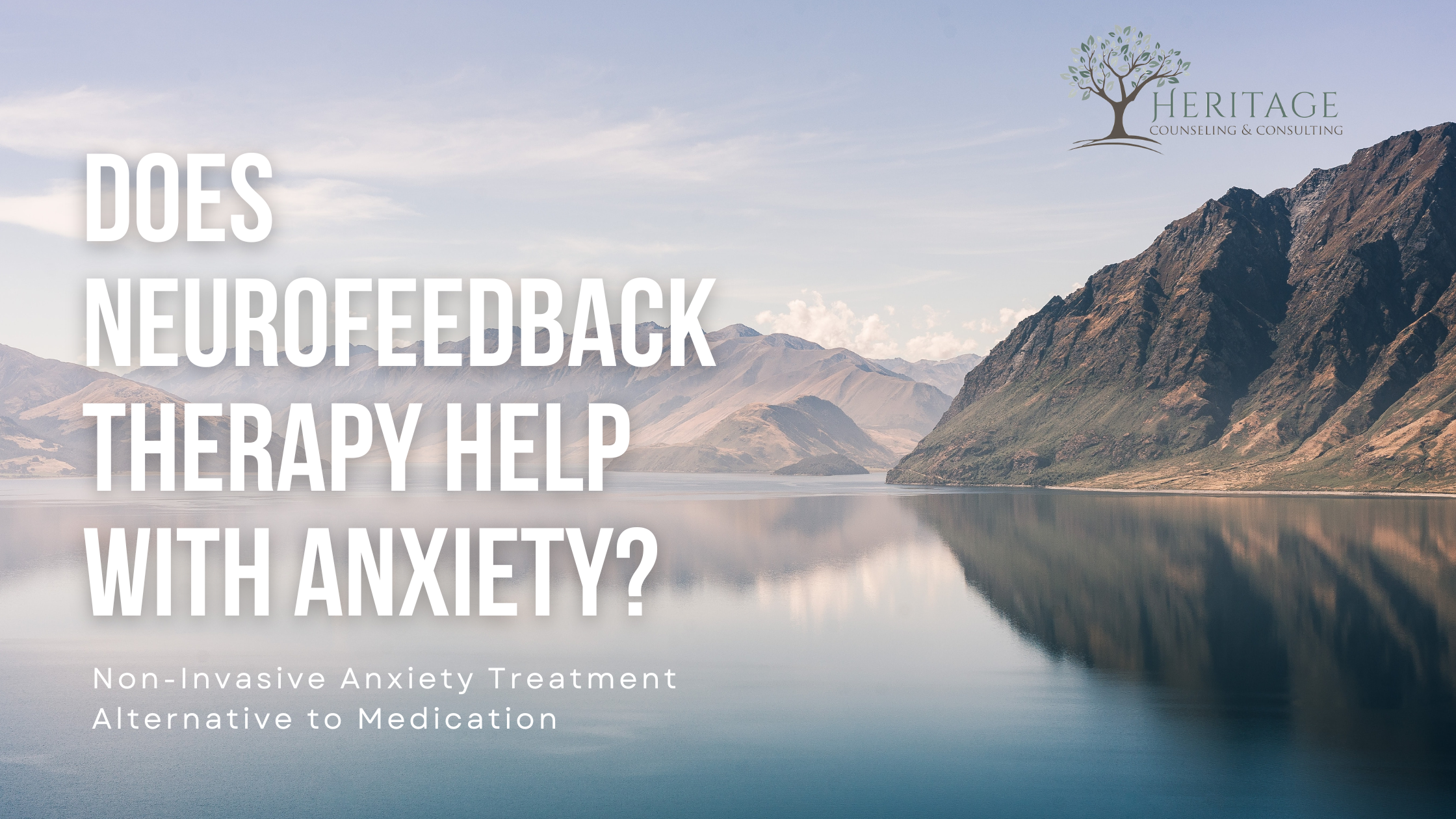What is Neurofeedback Therapy?
Neurofeedback is a science-based intervention using computer-based software that produces immediate feedback to the brain as it assesses brainwave activity, helping the brain function more efficiently. Neurofeedback is brain conditioning in which the brain is being trained to create greater efficacy as it promotes self-awareness. During a neurofeedback session, clinicians monitor brain wave activity while feedback is offered to the client (often in the form of visual feedback) based on changes in brain wave activity. Neurofeedback has been seen to be beneficial for various behavioral health symptoms and neurofeedback for anxiety specifically is a prominent and growing field.
How Does Neurofeedback Work for Anxiety?
We have seen that activities such as meditation, breathwork, medication, and fitness can improve anxiety. Neurofeedback has little to no adverse effects on an individual’s brain or body. Not only can it decrease one's feelings of anxiety, but neurofeedback for anxiety empowers and teaches the individual new ways to approach situations, signaling the brain to approach the situation with less anxiety.
The Treatment plan for Neurofeedback differs per client. Prior to beginning training sessions, clients meet with a Neurofeedback provider and an initial brain map assessment will be completed. After the qEEG is recorded and analyzed our Director of Neurofeedback will review the functional map of brain wave activity and brain functioning. Training sessions occur twice a week for up to 40 sessions, depending on the client and the training, more sessions may be required. Each session will be approximately 30 min long with a neurofeedback technician in which you will receive immediate feedback on brain wave activity. The sessions will often take place in-office but an at-home option is available.
Neurofeedback is a powerful treatment that can be used as an alternative to medication. Neurofeedback is clinically proven to decrease mental health symptoms as well as aid in performance enhancement with little to no negative side effects. Neurofeedback encourages the brain to continue to function at a stabilized rate. Although neurofeedback treats similar symptoms that therapy does. Neurofeedback can be a secret weapon when done alongside therapy. As neurofeedback is performed, emotions may arise, such as when anxiety is shifting, and a decrease in motivation may appear. It would be beneficial to walk through the thoughts and feelings behind the sudden decrease in motivation with a therapist. Dreis et al. (2015) stated that individuals who attend therapy solely are seen to report that there is still something missing. In this instance, if an individual who experiences anxiety is attending counseling sessions and neurofeedback training sessions simultaneously, not only do they have the coping skills needed to remain present in the current state of anxiety, but their brain will approach the anxiety-provoking situation with a calmer, and more relaxed state of mind.
What are the Benefits of Neurofeedback Therapy for Anxiety?
Anxiety can impact day-to-day activities and can interfere with core functioning abilities. Our brain signals to our body when something is unsettling in which we must learn to handle the anxiety or we will exhibit a deregulated state of mind. In this instance, Neurofeedback has allowed us to regulate our emotions and we are more likely to handle stressful situations more easily than before.
Eating well: consuming nutrient-dense foods to nourish your body
Prioritizing Sleep
Spending time outside
Moving your body in a way that feels safe for the individual
Partaking in activities that bring you joy
Journaling thoughts
Before Neurofeedback an individual may experience anxiety around a specific event such as having to speak in a public setting. In this way, neurofeedback is training the brain to process and think through the situation in a calmer state of mind. Neurofeedback has been seen to reduce key symptoms of anxiety such as:
Restlessness
Difficulty concentrating
Muscle tension
Sleep disturbances
Sudden periods of intense fear
Heart Pounding
Sweating
Shortness of breath
Panic Attacks
Can Neurofeedback Therapy be Used for Children?
Neurofeedback has been clinically evidenced to benefit children and adults. At Heritage, we offer neurofeedback services beginning at age six. Children who experience anxiety at a young age are fantastic candidates for neurofeedback. Training the brain at a young age has been seen to have an outstanding impact on its current and future state. It has been shown that neurofeedback can decrease anxiety symptoms in children such as encouraging an increase in attention in school settings, a desire to complete work more efficiently, improvement in grades, and approaching situations with other children in a calmer, more relaxed mindset, etc.
Choosing Neurofeedback Therapy for Anxiety Treatment
If you are struggling with anxiety, insomnia, migraines, irritability, etc., Neurofeedback might be an excellent option for you due to clinically proven results of decreasing symptoms of anxiety through Neurofeedback training sessions. Neurofeedback is a non-invasive, medication-free alternative to helping with one's anxiety.it is common for Individuals to work with their prescribers to titrate down on their medications due to a decrease in their symptoms. Although Neurofeedback can retrain the brain to react to situations, we recommend that counseling may be an additional need based on a client-by-client basis. Neurofeedback is an evidence-based practice that has been shown to have a high efficacy rate. Individuals have seen an immense improvement in their anxiety levels as well as their everyday functioning following neurofeedback training. The efficacy rate of Neurofeedback remains high due to the skilled clinicians performing the task and monitoring the brain waves for needed training adjustments.
If you believe Neurofeedback can benefit you or a loved one struggling with anxiety, Heritage Counseling would be honored to take the journey with you. Give us a call at 214-363-2345 to schedule a consultation and learn more.
Sources:
Balt. K., Toit, P.D., Smith, K., Rensburg, C.J. (2020) The effect of infraslow frequency neurofeedback on autonomic nervous system function in adults with anxiety and related diseases. 7(2): 64-74.
“Diagnostic and Statistical Manual of Mental Disorders - the DSM-5.” The DSM5, https://www.thedsm5.com/the-dsm-5/.
Dreis, S. M., Gouger, A. M., Perez, E. G., Ruso, G. M., Fitzsimmons, M. A., Jones, M. S. (2015) Using Neurofeedback to Lower Anxiety Symptoms Using Individualized qEEG Protocols: A Pilot Study. NeuroRegulation 2(3), 137-148.
Kerson, C., Sherman, R.A., Kozlowski, G.P. (2009). Alpha suppression and symmetry training for generalized anxiety symptoms. Journal of Neurotherapy, 13(3), 146–155.
Moore, N. C. (2000). A review of EEG biofeedback treatment of anxiety disorders. Clinical Electroencephalography, 31(1), 1–6.

